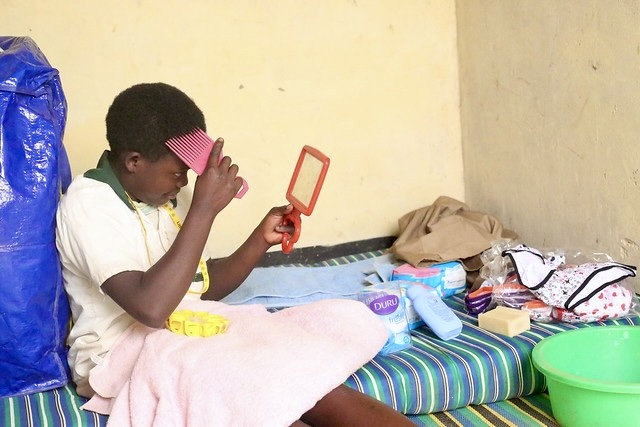
In the rich tapestry of Rwandan history, menstruation management has been integral to women’s lives, shaped by cultural practices and traditional knowledge. Before modern sanitary products, Rwandan women relied on locally available methods to manage their menstrual cycles. Historical accounts suggest that some women practiced temporary isolation during their periods, even digging shallow holes to sit in.
In this predominantly agricultural society, natural materials like soft leaves, moss, and plant fibers were commonly used. Cloth pads made from old fabrics were washed and reused, a practice still seen in some rural areas today, passed down from mothers to daughters.
While traditional practices continued, the late 19th and early 20th centuries saw advancements in menstrual hygiene products elsewhere. A notable figure was Mary Beatrice Kenner, who patented a sanitary belt in 1956, designed to hold menstrual pads in place discreetly. Although her invention faced delays due to racial discrimination, it paved the way for modern menstrual products. Meanwhile, many Rwandan women still relied on traditional methods.
In East Africa, we meet Nina, a 24-year-old Rwandan who experienced her first period at 14 without understanding what was happening. She describes it as “a nightmare.” Menstruation has long been a taboo subject in Rwanda, but the country is making strides in addressing menstrual hygiene management (MHM) as a vital aspect of public health and gender equality.
According to the United Nations Population Fund (UNFPA), about 26% of the global population is of reproductive age, translating to roughly 3 million women and girls in Rwanda who need access to menstrual products and education. The Rwandan Ministry of Health has recognized the significance of this issue, implementing various initiatives to improve MHM. (UNFPA Rwanda | Menstrual health & hygiene: Why there is still more to be done)
“Menstrual health is not just a women’s issue; it’s a matter of public health, education, and human rights,” said Dr. Diane Gashumba, former Minister of Health. This reflects the government’s commitment to addressing MHM holistically.
Recent years have seen remarkable progress, including a government program distributing free sanitary pads to schoolgirls in rural areas, benefiting over 200,000 students since 2019. Local organizations have also initiated projects to produce affordable, reusable pads, increasing access from 35% in 2015 to 68% in 2023. (UNFPA Rwanda | Menstrual health & hygiene: Why there is still more to be done)
In 2012, government introduced the scheme, which obligated all schools from primary to university to have a Girl’s room or Icyumba cy’umukobwa. As a standard requirement, outlined in 2021 ministerial order, the room is supposed to be equipped with sanitary pads, towels, painkillers, a bed, water, and soap among other hygiene tools. (The Menstrual Room Keeping Rwandan Girls in School – HealthSojo Afirica Initiative (healthsojo-africa.org)
The girl’s room addresses several challenges that girls face during their monthly periods by providing a space to rest when cramps become unbearable, ensuring privacy, and offering sanitary pads. However, some girls have expressed concerns about receiving only a single pad instead of a full packet. They would greatly appreciate having access to a sufficient supply to meet their needs.
Despite significant progress, myths and misconceptions about menstruation persist in Rwanda. Many view menstruation as a curse or punishment, and some believe menstrual blood is “dirty.” These beliefs contribute to stigma and silence, hindering women’s full participation in daily activities. A study by the World Health Organization (WHO) found that 38% of Rwandan women believed menstruation to be a form of punishment.
Period blood is not “dirty” blood; it’s a natural mix of blood, uterine lining tissue, cervical mucus, and vaginal secretions, reflecting a healthy menstrual cycle. Each month, the body prepares for a potential pregnancy, and if it doesn’t occur, the uterus sheds its lining. This process is a normal sign of reproductive health, and misconceptions about menstruation being “dirty” often stem from cultural taboos rather than biological reality. Understanding this helps promote a more positive view of menstruation as a vital part of women’s health.
The impact of these misconceptions is starkly illustrated by Mutoni, a 14-year-old who faced humiliation in class from boys when her period unexpectedly stained her uniform. This incident led her to miss school for a week, affecting her confidence and academic progress. Such experiences underscore the need for comprehensive menstrual health education for all genders.
Some boys and men contribute to the humiliation of girls during their periods by failing to provide support. Despite their influential roles as fathers, policymakers, and leaders in various sectors, they should actively engage in the fight against menstrual stigma. By breaking the silence and promoting gender equality, they can help create a more supportive environment for everyone.
In response to these challenges, SAYE has incorporated Promoting Positive Masculinity (PPM) training. This program educates boys on sexual and reproductive health and encourages them to become allies in creating a supportive environment for menstruating girls. By fostering empathy and understanding, PPM helps challenge harmful stereotypes, ensuring incidents like Mutoni’s are less likely to occur.
In 2019, the government of Rwanda added sanitary pads to the list of VAT-exempt goods to improve their affordability
https://en.igihe.com/spip.php?page=mv2_article&id_article=40502
However, despite this effort, pads remain inaccessible for many, highlighting the need for a holistic approach to address the issue. Part of the solution should involve motivating private companies to include pad donations in their corporate social responsibility initiatives. Additionally, providing sanitary pads in bathrooms, similar to toilet paper, could enhance accessibility and normalize their use.
Local companies like Tamu Pads and Kosmotive are stepping up to address period poverty by providing affordable, high-quality, and reusable menstrual products, ensuring fewer girls miss school due to their periods. These initiatives not only improve individual educational outcomes but also contribute to broader goals of gender equality and economic development.
This is not just an economic issue; it’s a social and health issue. SAYE COMPANY LTD/DUKATAZE plays a crucial role in promoting MHM through the Kigali Menstruation Station, providing adolescents with vital information on sexual and reproductive health. We involve boys in training sessions, offer free sanitary pads, and run school clubs that educate adolescents weekly. Collaborating with local leaders, we aim to create a supportive community environment that equips adolescents with the resources they need to thrive.
Nina’s experience highlights the importance of breaking the silence surrounding menstruation. Rwanda’s comprehensive approach to MHM is yielding promising results. By dispelling harmful beliefs and actively involving men and boys in MHM initiatives.
The change we want to us require a collective efforts , a more informed and supportive society as well. This transformation ensures that future generations of girls like Nina will face their first period with knowledge and dignity, rather than fear and confusion. Let’s all thrive for no more period nightmares for young girls.
SAYE COMPANY LTD /DUKATAZE
